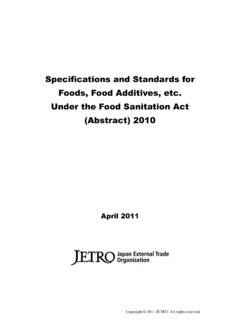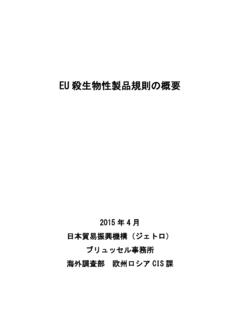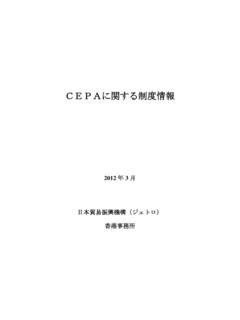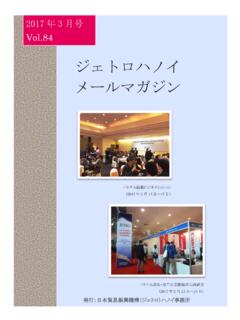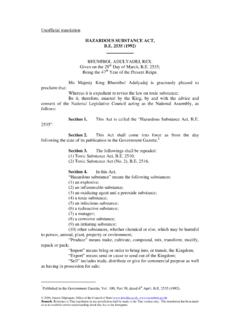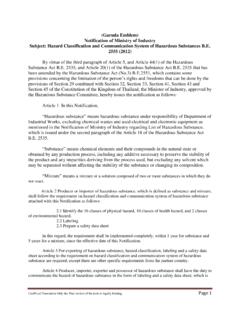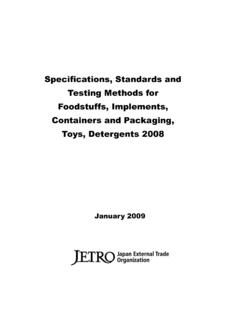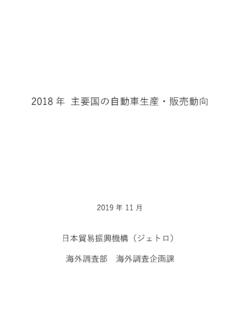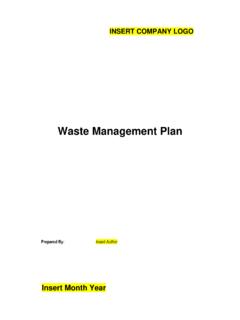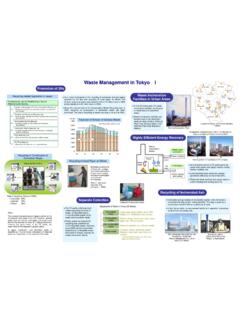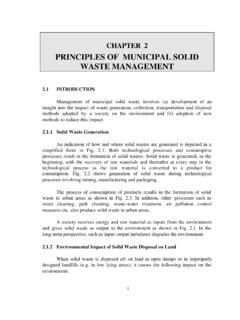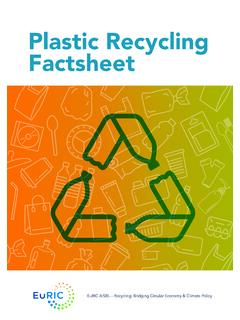Transcription of Cosmetics - JETRO
1 - Cosmetics - - 1 - Guidebook for Export to Japan 2011 Copyright (C) 2011 JETRO . All rights reserved. The Pharmaceutical Affairs Act defines Cosmetics as follows. "Articles with mild action on the human body, which are intended to be applied to the human body through rubbing, sprinkling or other methods, aiming to clean, beautify and increase the attractiveness, alter the appearance or to keep the skin or hair in good condition." Cosmetics are classified into "perfume and eau de cologne" including fragrance, "makeup Cosmetics " including foundation creams, lipsticks and eye makeup, "skin care Cosmetics " including facial cream, skin lotion, skin milk and cleansing cream, "hair care products" including hair dye, shampoo and hair treatment, and "special-purpose Cosmetics " including sunscreen. Under the Act, soaps are classified as Cosmetics . Scope of coverage 1. Points to Note in Exports to and Sales in Japan (1) Import Regulations and Procedures The following paragraph describes the regulations and procedural requirements at the time of importation.
2 Importers of Cosmetics assume all quality assurance and product liability for Cosmetics . Consequently, cosmetic articles should not be imported based on marketability only. It is necessary for them to be ready to take full responsibility for imported Cosmetics through regulation analysis and safety testing. The importation of Cosmetics is subject to the provisions of the Pharmaceutical Affairs Act, and aerosol products are subject to the provisions of the High Pressure Gas Safety Act. The Customs Tariff Act prohibits the importation of fake name brand products and knock-off copies, and such items are subject to confiscation or destruction at customs, based on the provisions of the Customs Act. Importers can even be subject to criminal penalties, including fines and imprisonment. However, the Pharmaceutical Affairs Act imposes no restrictions on substances that are imported into Japan as raw materials for Cosmetics and then subjected to domestic processing.
3 Pharmaceutical Affairs Act When importing and distributing Cosmetics , under the provisions of the revised Pharmaceutical Affairs Act, which went into effect as of June 1, 2009, the importer must obtain a primary distributor's license for Cosmetics . The primary distribution business refers to the sale, rental, or lending of manufactured (including delegated to another, but not including manufacturing conducted for another) or imported Cosmetics . Consequently, companies that do not possess their own manufacturing facilities may still obtain a license. The revised Act abolished the importer license classification. Any primary distributor that engages in the final packaging , labeling in the Japanese language, or storage of the imported product, is required to obtain a cosmetic manufacturer's license. Even if the product was labeled overseas in the Japanese language, in addition to obtaining a primary distributor's license, the importer of that product must obtain a Cosmetics manufacturer's license (under a classification of " packaging , labeling, and storage only") (excluding the case of manufacturing that is delegated to another licensed manufacturer), because the product must be temporarily stored in a facility that has a manufacturer's license in Japan, and availability of shipment must be judged after the necessary tests.
4 Item Definition HS Code Perfume and eau de cologne Makeup Cosmetics Skin care Cosmetics Hair care products Special-purpose Cosmetics cosmetic soaps Perfume and eau de cologne Foundation creams, lipsticks, eye makeup, and others Skin lotion, essence, skin milk, cleansing cream, and others Hair dye, shampoo, hair treatment and others Sunscreen, shaving cream and others Soaps for Cosmetics 3303 , 2, 30, 91 3305 , 20, 30, 90 , 20-010 Cosmetics - Cosmetics - - 2 - Guidebook for Export to Japan 2011 Copyright (C) 2011 JETRO . All rights reserved. [Primary distributor's license] Primary distributor's license applications are filed with the competent prefectural pharmaceutical affairs division with jurisdiction over the business office where the marketing supervisor-general serves. Licenses are to be renewed every five years. Applicants must conform to the Good Quality Practice (GQP) standards and Good Vigilance Practice (GVP) standards, and they must appoint a marketing supervisor-general.
5 The Act clearly assigns responsibility to primary distributors to assure post-marketing product quality, and to undertake appropriate actions for safety management. Applicants are required to obtain a business code number in advance. Documents required for application include a copy of the corporate registration (in the case of a corporation), a list of the segregation of duties, a medical certificate attesting an applicant, documents certifying the qualifications of the marketing supervisor-general and an employment contract, documents verifying the quality management system and the post-marketing safety management system, a floor plan of the business office and storage facility, and others. Application for a cosmetic manufacturer's license (under the classification of " packaging , labeling, and storage only") requires an outline of the physical facility, a floor plan of the manufacturing facility, documents certifying the qualifications of the responsible engineering manager and an employment contract, a copy of any contract with a testing laboratory (when used).
6 After obtaining the primary distributor's license but before initiating product importation, the primary distributor must file a Notification form of cosmetic manufacture or importation brand name (with the Pharmaceutical and Medical Devices Agency (PMDA)), the Notification form of primary distribution of Cosmetics (with the same prefecture as that which has granted the primary distributor's license), and the Import notification form of Cosmetics for primary distribution (with the Kanto-Shinetsu Regional Bureau of Health and Welfare, or the Kinki Regional Bureau of Health and Welfare). Either they must attach to those forms an ingredients list from the import supplier manufacturer or, if this list cannot be obtained, a record of the testing and inspection results verifying that the product does not contain any prohibited combination. [Approval for primary distribution by product category] The Cosmetics Standards (Ministerial Notification in September 2000) defines the ingredients that are subject to prohibition or restriction in Cosmetics combinations, and those that are allowed in Cosmetics combinations in specific ingredient groups.
7 Antiseptics, ultraviolet ray absorbents and tar coloring are subject to a positive list that indicates the maximum mixture quantities. All other ingredients may be used in Cosmetics combinations after the safety verification and selection at their own liability, except those covered by a negative list of combinations that either prohibits or limits them. In this regard, however, all ingredient names must be listed in the labeling. Provided the ingredients do not violate the Cosmetics Standards and all the ingredients are indicated on the labeling, approval for primary distribution by product item is not required. However, products containing amounts of ingredients in excess of the notifiable limit, or new ingredients without a history of prior usage, or which contain non-disclosed ingredients, must obtain primary distribution approval for each product item. [Preparation and maintenance of quality standard statement] Primary distributors are required to properly evaluate the results of production management and the quality control of Cosmetics to be actually distributed, decide whether to ship to the market by lot, and prepare the records (quality standards) regarding whether to and where to ship the Cosmetics .
8 They must retain these records for five years. In addition, primary distributors of Cosmetics must establish a system capable of providing accurate information in response to consumer inquiries, along with a system for handling complaints about product quality and the like as well as product recalls. They shall prepare and retain records required for the foregoing. Furthermore, if the primary distributor becomes aware of a research report indicating that one of the cosmetic product imports may have a harmful effect, the primary distributor must report that fact to the Minister of Health, Labour and Welfare within 30 - Cosmetics - - 3 - Guidebook for Export to Japan 2011 Copyright (C) 2011 JETRO . All rights reserved. days. High Pressure Gas Safety Act Aerosol products ( , hair spray) must be separately inspected at the time of importation. If the relevant products meet certain requirements specified under the High Pressure Gas Safety Act, however, they will be excluded from the application of the Act, on condition that the products describe precautions for consumers, but written results of the tests certifying that the products do not fall under the Act must be submitted to customs.
9 (2) Regulations and Procedural Requirements at the Time of Sale The sale of Cosmetics is subject to the provisions of the Pharmaceutical Affairs Act, the High Pressure Gas Safety Act, and the Fire Service Act. In addition, Cosmetics and cosmetic soaps are subject to the Act against Unjustifiable Premiums and Misleading Representations. Products that infringe on intellectual property rights are regulated by the various intellectual property laws (Trademark Act, Patent Act, Unfair Competition Prevention Act, etc.). Prospective importers must be aware of these considerations, as rights holders may initiate legal action. Besides this, door-to-door sales, mail-order sales, chain sales, and other specified commercial transactions are subject to the provisions of the Act on Specified Commercial Transactions. In addition, as to containers and packaging , labeling may be subject to the provisions of the Law for Promotion of Effective Utilization of Resources, and recycling may be subject to the provisions of the Law for Promotion of sorted collection and recycling of containers and packaging (certain small-scale providers are exempted from this regulation).
10 Pharmaceutical Affairs Act Under the Act, Cosmetics do not require a retailer's license, so anyone may resell them without restriction. But, the sale of defective Cosmetics is prohibited, such being defined as follows: products that do not conform to the Cosmetics Standards, products that are unclean, degraded in quality, which contain foreign substances, which are contaminated with disease-causing microorganisms, or which make use of unapproved tar coloring. In addition, the Act specifies labeling items on the containers or packaging of Cosmetics , and certain items may not appear in labeling. Products that violate labeling regulations are deemed to be improperly labeled Cosmetics , and their sale is prohibited. Advertising and labeling for Cosmetics are also regulated under the Act. High Pressure Gas Safety Act When selling products in aerosol containers, they must be labeled in accordance with the provisions of the High Pressure Gas Safety Act.
